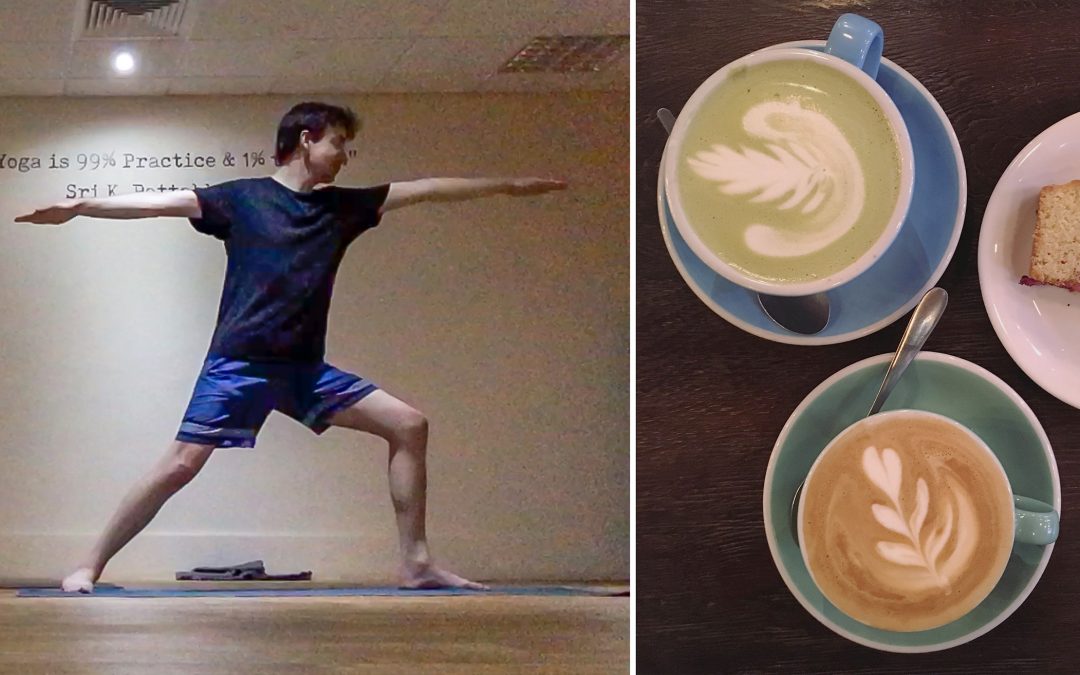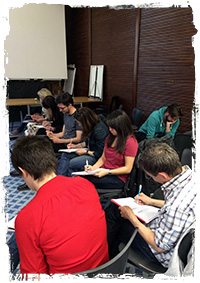Intro
The PGR Studio Mentoring scheme can be a great way to learn from others. But what is it like to meet your mentor or mentee, and what can you get out of it? Here we look at the experience of Edmund Hunt and Simon Crisp who have regularly been meeting since being paired at a PGR Studio event last November.
This post takes the form of a yoga instructional manual. This format is something Simon played with in one of his PGCert assignments, and Edmund was keen to replicate here as the pair now regularly schedule their mentor catch-ups around taking a hot yoga class together.
Exercise
PGR Studio Mentoring Scheme
Description
It is only by learning from others that you can truly learn about yourself. This exercise sees BCU researchers at different stages of their academic career cultivate a mutually beneficial developmental relationship through the PGR Studio Mentoring scheme.
Method
Sign up to the PGR Studio mentoring scheme – Meet each other at an organized event – Learn about each other’s academic journey and research – Identify common interests or developmental issues – Continue to meet regularly – Identify learning/developmental opportunities from the relationship – Maintain a mentor scheme journal reflecting on the experience.
Experience and Benefits
Edmund – Having only recently discovered the PGR Studio Mentoring scheme, I was pleased to learn that I had the opportunity to participate. I graduated with my PhD from BCU in 2018, and I am currently navigating my way through postdoctoral life, thanks to a Postdoctoral Research role at Royal Birmingham Conservatoire (BCU). The launch of the mentoring scheme happened to clash with one of my current composition research projects in Aldeburgh, Suffolk, so my first meeting with Simon was at the end of November 2018.
When we met, my initial nervousness quickly disappeared as we talked about our routes into the PhD, our interests, and our experiences of academic life. I was fascinated to learn about Simon’s research. I had very limited knowledge of yoga, despite my dad’s insistence throughout my teenage years that yoga would be ‘good for me’. When Simon suggested attending a yoga class in conjunction with our monthly meetings, I was pleased (although slightly trepidatious). I was surprised to realise how much I enjoyed it. I feel as though my experience of yoga has helped my approach to working with dancers and choreographers in my current creative research projects.
Over the course of our meetings and yoga sessions, it has been enjoyable to get to know Simon and to find out about his work. I’ve gleaned some helpful tips from hearing how Simon’s background in journalism has influenced his approach to writing and research. I was initially unsure what I could contribute to the mentoring scheme. During the early stages of my PhD, much of my work felt like a process of trial and error. Many of my most significant discussions with supervisors, friends and colleagues had taken place not in an academic context but in informal conversations. It soon dawned on me that the PGR Mentoring programme was designed to facilitate precisely this sort of discussion. By occupying a space outside the conventional academic environment, meetings create the ideal conditions for the serendipity whereby knowledge is shared and friendships are forged. I look forward to our next meetings.
Simon – Edmund was unable to attend the PGR Studio Mentoring pairing event, so our first ‘in-person’ meeting was at a coffee shop in town. Once we had got past the blind-date feeling of having been paired together, we chatted both about our research and personal lives and found that we had many things in common. I could also see that Edmund had gone through many of the academic experiences which I had coming up, and how drawing on those experiences could be useful.
When I was talking about my research, Edmund had said he’d never tried yoga but was interested in doing so, so for the next meetup I arranged for us both to take a class beforehand. As we moved from warrior poses to sipping flat-whites, we again talked about what we had been doing with Edmund chatting about his work including writing a bid and preparing to present his work at a conference, while I was able to get his advice on work I was producing and an M4C funding application I was about to submit.
Since then, because Edmund has started going to hot yoga classes himself, I have started joining him at one before out monthly meetings where we will go for a coffee or get something to eat. Having this shared experience has helped make the mentoring meetups feel more like a real friendship, which in turn makes it easier to chat about things and benefit from the relationship. For me, the main benefits have been seeing how things I am going through, or emotions I am experiencing, are not unique, and being able to talk to Edmund about how he dealt with various situations. Hearing about what Edmund is doing now also gives me a great insight into the pressures and demands of an academic career which may await me.


